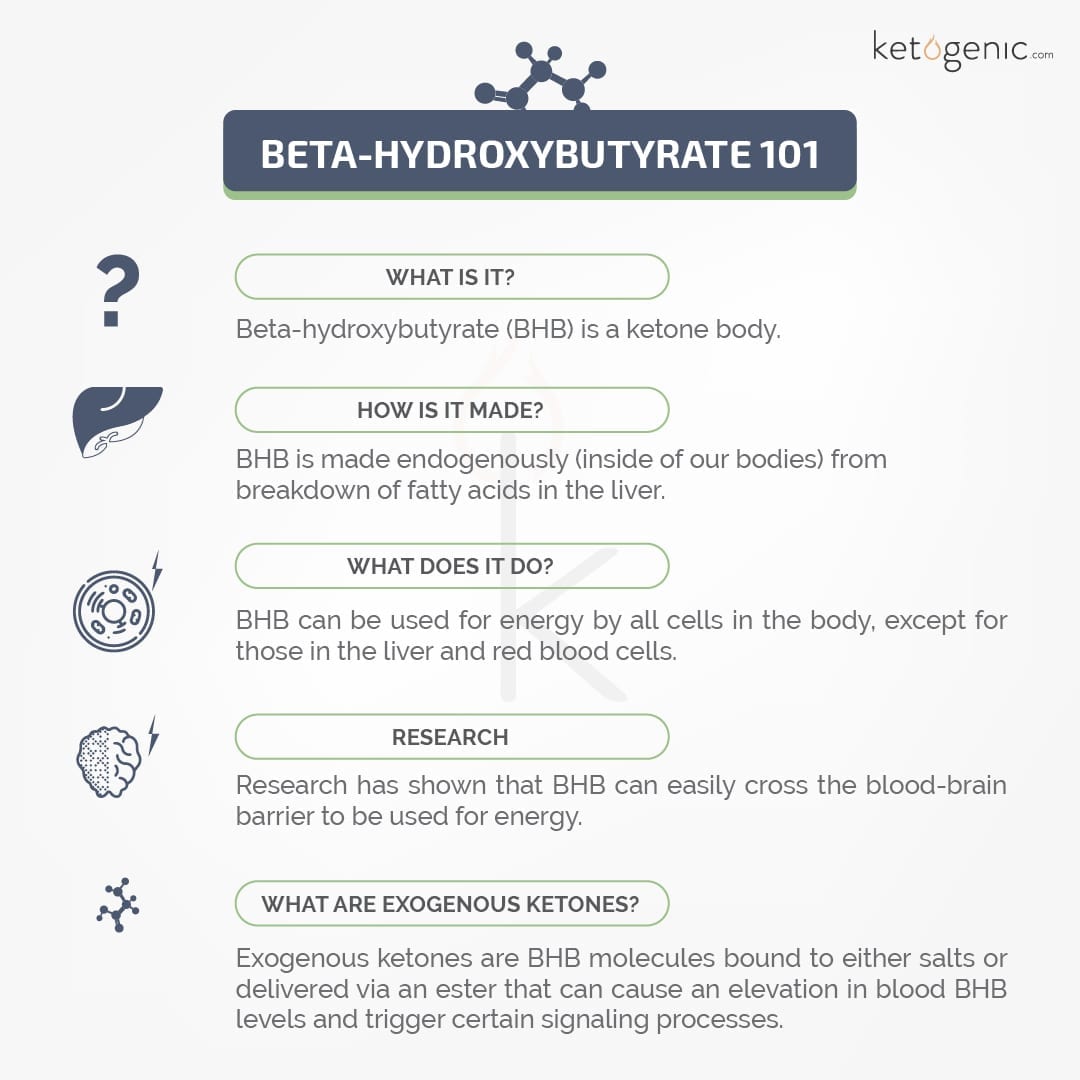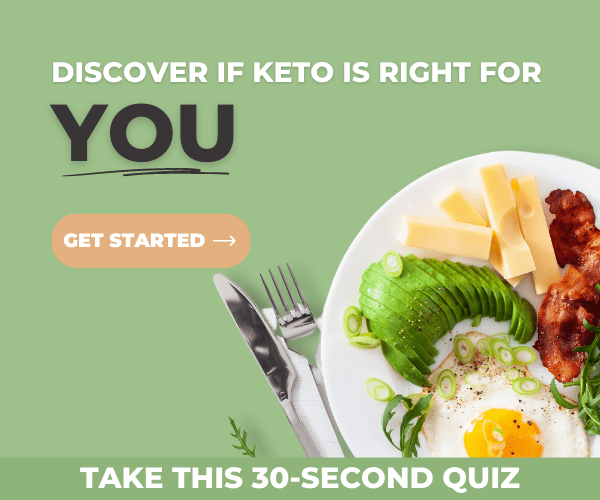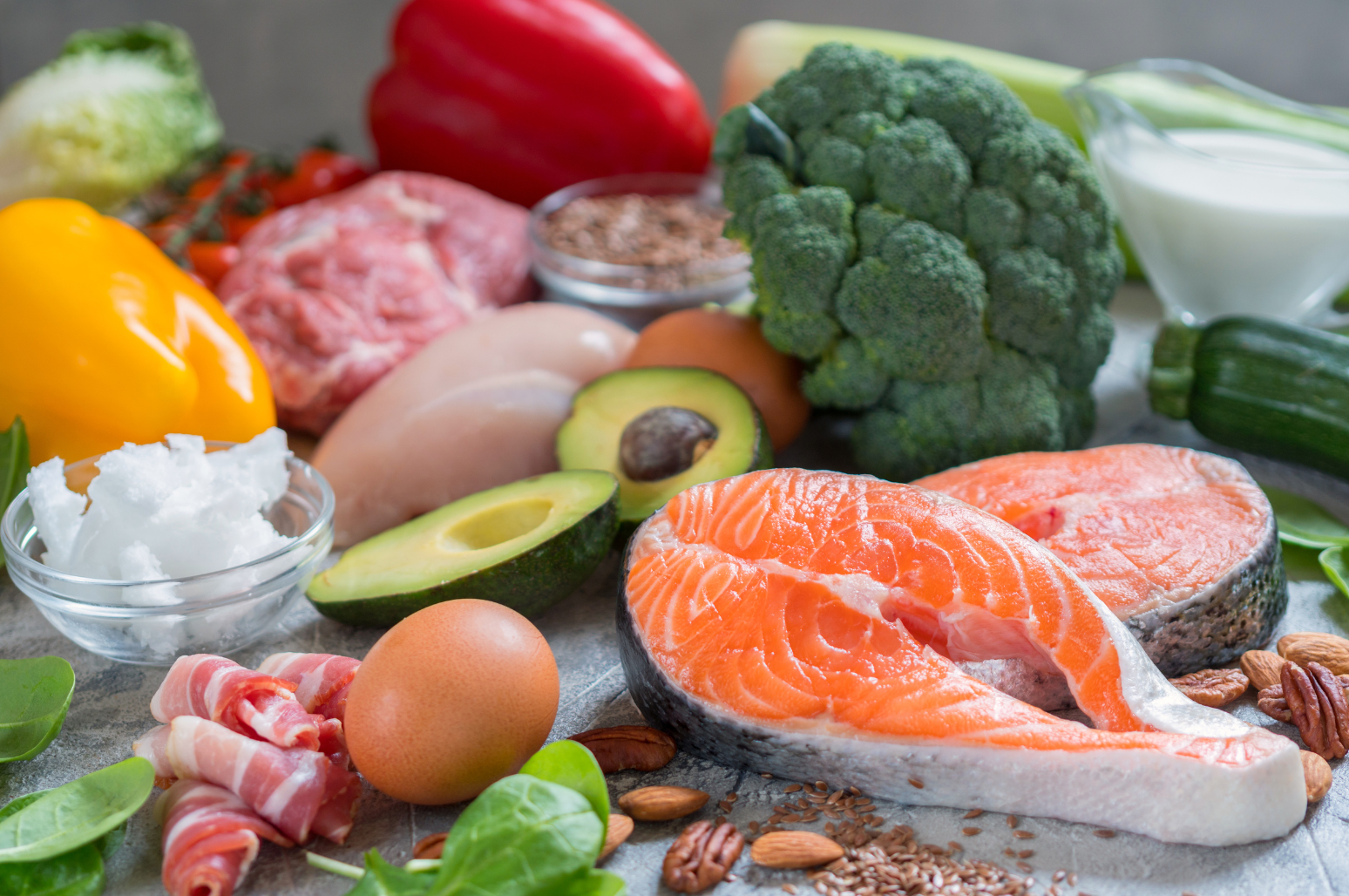
Ketones are commonly associated with the ketogenic diet, but the term ketone actually describes a specific structure of an organic molecule. If ketone is a chemistry term, you might be wondering what exactly are ketones and what they have to do with ketosis. Let’s go over it!
What are Ketones in Chemistry?
In chemistry, the term ketone describes a function group that has a carbon double bonded to an oxygen and two R groups, as shown below (R2C=O).
The simplest ketone is acetone which has the structure CH3-CO-CH3.
Ketones are water-soluble, more reactive than aldehydes, and have a boiling point higher than aldehydes.

What are Ketones In Reference to the Ketogenic Diet?
When someone is talking about ketones in the context of the keto diet, they are referring to ketone bodies that can be used as fuel for the body. There are two different types of ketones: endogenous ketones and exogenous ketones.
Endogenous Ketones
These ketones are produced within the human body. Humans produce three different ketones: acetone, acetoacetate, and beta-hydroxybutyrate (BHB). BHB is produced in the largest quantities and is what is tested when taking blood measurements.

Endogenous ketones are produced by the liver through the breakdown of fatty acids. These ketones are produced and used as a fuel source when carbohydrate consumption is limited. The process of producing ketones is called ketogenesis and it puts the body in a metabolic state of ketosis.
Exogenous Ketones
Exogenous ketones are produced outside of the body and consumed. Exogenous ketones are comprised of BHB. R-BHB (also called D-BHB) has been shown to be more ketogenic than the S/L enantiomer. [1]
Consumption of exogenous ketones can increase blood ketone levels and enhanced the benefits of ketone bodies. [2]
Exogenous ketones are metabolized similar to endogenous ketones but do not impair endogenous production unless consumed in large quantities.

What Are The Benefits of Ketones?
Research shows that ketones have numerous benefits! From reducing inflammation to sparing muscle mass, BHB (the primary ketone body produced by humans) has wide-ranging benefits. Some of these are outlined below:
Do Ketones Benefits You?
Comment below and share your experience on the benefits of ketones and the ketogenic diet!
References
Cuenoud B, Hartweg M, Godin JP, Croteau E, Maltais M, Castellano CA, Carpentier AC, Cunnane SC. Metabolism of Exogenous D-Beta-Hydroxybutyrate, an Energy Substrate Avidly Consumed by the Heart and Kidney. Front Nutr. 2020 Feb 19;7:13. doi: 10.3389/fnut.2020.00013. PMID: 32140471; PMCID: PMC7042179.
Stubbs, B. J., Cox, P. J., Evans, R. D., Santer, P., Miller, J. J., Faull, O. K., Magor-Elliott, S., Hiyama, S., Stirling, M., & Clarke, K. (2017). On the Metabolism of Exogenous Ketones in Humans. Frontiers in physiology, 8, 848. https://doi.org/10.3389/fphys.2017.00848
Yamanashi T, Iwata M, Kamiya N, Tsunetomi K, Kajitani N, Wada N, Iitsuka T, Yamauchi T, Miura A, Pu S, Shirayama Y, Watanabe K, Duman RS, Kaneko K. Beta-hydroxybutyrate, an endogenic NLRP3 inflammasome inhibitor, attenuates stress-induced behavioral and inflammatory responses. Sci Rep. 2017 Aug 9;7(1):7677. doi: 10.1038/s41598-017-08055-1. PMID: 28794421; PMCID: PMC5550422.
Youm YH, Nguyen KY, Grant RW, Goldberg EL, Bodogai M, Kim D, D'Agostino D, Planavsky N, Lupfer C, Kanneganti TD, Kang S, Horvath TL, Fahmy TM, Crawford PA, Biragyn A, Alnemri E, Dixit VD. The ketone metabolite β-hydroxybutyrate blocks NLRP3 inflammasome-mediated inflammatory disease. Nat Med. 2015 Mar;21(3):263-9. doi: 10.1038/nm.3804. Epub 2015 Feb 16. PMID: 25686106; PMCID: PMC4352123.
Parker, B. A., Walton, C. M., Carr, S. T., Andrus, J. L., Cheung, E., Duplisea, M. J., Wilson, E. K., Draney, C., Lathen, D. R., Kenner, K. B., Thomson, D. M., Tessem, J. S., & Bikman, B. T. (2018). β-Hydroxybutyrate Elicits Favorable Mitochondrial Changes in Skeletal Muscle. International journal of molecular sciences, 19(8), 2247. https://doi.org/10.3390/ijms19082247
Veech RL, Chance B, Kashiwaya Y, Lardy HA, Cahill GF Jr. Ketone bodies, potential therapeutic uses. IUBMB Life. 2001 Apr;51(4):241-7. doi: 10.1080/152165401753311780. PMID: 11569918.
Buga, A., Kackley, M. L., Crabtree, C. D., Sapper, T. N., Mccabe, L., Fell, B., LaFountain, R. A., Hyde, P. N., Martini, E. R., Bowman, J., Pan, Y., Scandling, D., Brownlow, M. L., O'Connor, A., Simonetti, O. P., Kraemer, W. J., & Volek, J. S. (2021). The Effects of a 6-Week Controlled, Hypocaloric Ketogenic Diet, With and Without Exogenous Ketone Salts, on Body Composition Responses. Frontiers in nutrition, 8, 618520. https://doi.org/10.3389/fnut.2021.618520








